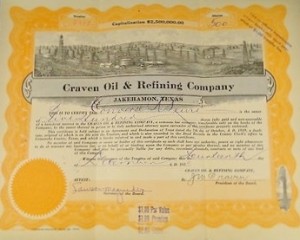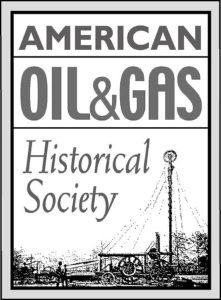
 Soon after World War I, the son of a famous general sought opportunities to get rich in the booming oilfields of Texas.
Soon after World War I, the son of a famous general sought opportunities to get rich in the booming oilfields of Texas.
Leonard Wood Jr. was the son of Major Gen. Leonard Wood, a famed Medal of Honor recipient and former chief of staff of the Army. Wood also was a veteran of military service, having served in the Great War as a lieutenant in the 81st Infantry Division.
Following the war (and a promotion to captain), the younger Wood and an associate, former Capt. J. M. Craven, in 1920 formed the Craven Oil & Refining Company, with Craven as president and Wood as vice president. That same year, Wood’s father sought the Republican nomination for president.
Craven Oil and Refining – capitalized at $2.5 million – aggressively marketed its stock in newspapers at $1 per share promoting plans to build a $250,000 refinery with 3,000 barrel a day capacity north of Jakehamon, Texas.
The idea was to process the abundant production of the Desdemona oilfield at Hog Creek, east of Abilene in Eastland County.
In April 1920, a San Francisco Chronicle advertisement proclaimed: “You can share in the enormous profits of these big gushers by helping us to build our monster refinery in the heart of the great desdemona oil pool.”
The Chronicle advertisement further editorialized, “a unique feature of their plan of financing the Craven Oil & Refining Company is the partial payment plan they offer to officers and enlisted men of the United States Army and Navy. Many of these are stockholders in the company realizing that two men such as Captains Craven and Wood can be relied upon absolutely to act for the best interests of all concerned.”
Not all readers were equally enthusiastic. Many excoriated Wood, claiming he was exploiting his father’s name and reputation.
“Such commercializing by young men of an honorable name and an equally honorable record in the War is deplorable,” scolded the Mining and Scientific Press. “Captains Craven and Wood will be well advised to cease exploiting their military records, or their family names, in such business.”
Craven Oil & Refining did not fare well constructing a refinery or finding leases for successful drilling operations in Eastland County. Three wells that did find oil were small producers in the oil-saturated market of post-war America.
The Craven wells drilled were near Sipe Springs, today a ghost town, as is Jakehamon. In fact, Desdemona’s petroleum boom abruptly ended . Both Jakehamon banks were closed by the end of 1921.
With debts quickly mounting, Craven Oil & Refining Company transformed itself into the Acme Production Company, which reissued 300,000 shares of its own stock – replacing the Craven certificates. Capt. Leonard Wood Jr., was president of the new Acme Production.
It wasn’t long before Acme Production was beset by allegations of mail fraud in Maryland and was forced to quit doing business – an action resulting from states enacting “blue sky” laws regulating securities sales to prevent fraud.
As U.S. Supreme Court Justice Joseph McKenna noted in 1917, the laws addressed “speculative schemes which have no more basis than so many feet of blue sky.”
“I headed the Acme Production Company for a time, it had good prospects,” Capt. Wood told the Times Daily newspaper in December 1923. “But some of our wells played out. I could not raise the necessary capital to continue and so we closed down.”
The general’s son filed for bankruptcy on September 10, 1925, citing liabilities of $14,585 against assets of $842.
Today, Craven Oil & Refining Company stock certificates are valued by collectors. Not far from the Desdemona oilfield, an oil discovery in Ranger led to another World War I veteran, Conrad Hilton, buying the his first hotel. Read Oil Boom Brings First Hilton Hotel.
___________________________________________________________________________________
The stories of exploration and production companies joining petroleum booms (and avoiding busts) can be found updated in Is my Old Oil Stock worth Anything? The American Oil & Gas Historical Society preserves U.S. petroleum history. Please support this AOGHS.ORG energy education website. For membership information, contact bawells@aoghs.org. © 2018 Bruce A. Wells.
___________________________________________________________________________________

